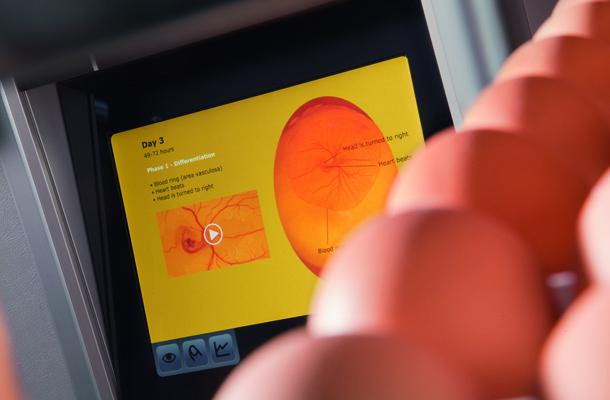By continually ‘reading’ the time-varying metabolism of a specific batch of embryos, AMF™ adapts control parameters (humidity and CO2) to fine-tune the incubator environment accordingly. Ultimately AMF™ maximizes uniformity by optimising airflow, the evaporation of moisture and air redistribution, to achieve an ideal weight loss pattern.
Cargill’s Honduran hatchery carried out trials, to observe how AMF™ simultaneously provides better and more stable control over relative humidity and CO2 during the first 18.5 days of incubation, to provide day old chicks of favourable quality.
Methodology
Flocks of similar age were compared over a similar time period. Some setters were operated with conventional controls, some machines with AMF™ control on SmartSet™ incubators. During the tests, we looked at the following variables: embryonic mortality, pipped not hatched, rejects %, contaminated, hatch of fertiles % and weight loss at 18 days.
Results
The incubators with AMF™ control were much more stable in terms of humidity. This is of great importance in the Honduran climate, with relative humidities from 70 – 80 % RH.
Hatch of fertiles (HOF %), rejects, contaminated
No difference in the hatch of fertiles or contaminated eggs was observed in this trial. However, a reduction of 0.2% in cull chicks was observed. This was due to better chick quality, with less inflated bellies, due to better humidity control.
| System | Hatch of fertiles (HOF) | Cull chicks (%) | Contaminated eggs (%) |
| AMF™ | 89.3% | 1.0% | 0.1% |
| Conventional | 89.2% | 1.2% | 0.1% |
Comparison AMF™ system vs conventional setter control
Weight loss, embryonic mortality, pipped not hatched.
Better weight loss by 0.5% was observed in favour of the setters with AMF™ control. We also observed a 1.2% reduction in early embryonic mortality (days 1-7), and a 0.1% reduction of pipped not hatched, which can confidently be associated with better weight loss at 18 days.
| System | Weight loss (%) | EEM 1-7 days | MEM 8-14 days | LEM 15-21 days | Pipped not hatched (%) |
| AMF™ | 11.95% | 3.2% | 0.6% | 2.4% | 0.4% |
| Conventional | 11.4% | 4.4% | 0.4% | 2.5% | 0.5% |
Comparison AMF™ system vs conventional setter control
Conclusions
Adaptive Metabolic Feedback (AMF™) results in better, more stable control of humidity in the incubator, which produces a more accurate weight loss pattern at 18.5 days. Improvements in early embryonic mortality (-/- 1.2%) and in cull chicks at hatch (-/- 0.2 %) were observed.
Weekly set: 1,382,400 eggs (12 setters of 115,200); Cull chicks improvement: 0.2 %
Financial impact: 1,382,400 eggs * 0.2% = 2765 doc/wk = 144,000 doc/year at a price of US$0.35/doc = US$50,000 per year.
A 0.2% improvement in cull chicks for Cargill’s operation in Honduras represents an annual gain of US$50,000, giving the system a pay back time of around 1.5 years.
